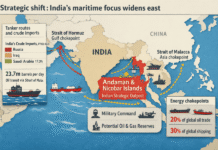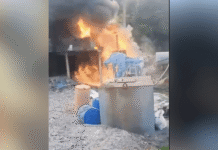In a move to strengthen administrative oversight and ensure effective service delivery, the Deputy Commissioner of Nicobar District, Amit Kale, undertook an official inspection of Chowra and Teressa Islands. The visit formed part of the administration’s ongoing efforts to monitor development projects and engage with tribal leadership in remote island communities.
During the visit, the Deputy Commissioner chaired detailed review meetings with members of the Tribal Councils and Village Headmen, accompanied by officials stationed in both Chowra and Teressa. The discussions focused on identifying pressing local issues, addressing developmental gaps, and enhancing inter-departmental coordination to expedite projects.
In Chowra, key installations were physically inspected, including the RO water treatment plant, the local school, Health & Wellness Centre, jetty area, and water supply infrastructure. The condition of internal roads was also reviewed. Kale directed that hygiene and cleanliness be maintained at the health facility and issued instructions to the BSNL team to ensure continuous operation of the VSAT communication system, essential for maintaining connectivity on the island.
Continuing his field visit to Teressa Island, the Deputy Commissioner covered the villages of Alurong, Luxi, Chukmachi, and Kalaasi, where he engaged directly with residents to understand their concerns. Government schemes implemented in these areas were reviewed on-site, with attention to community-level feedback and functionality.
He inspected infrastructure associated with the Pradhan Mantri Gram Sadak Yojana (PMGSY), as well as the schools, Anganwadi Centre, and Primary Health Centre in the region. Based on his observations, departments were directed to prepare for road construction activities post-monsoon, with work expected to begin by November 2025 under the PMGSY scheme.
One of the key areas highlighted during the visit was water management. Kale emphasized the need to accelerate the construction of water ponds in Chowra to improve long-term storage and supply, especially during dry months. These measures, he stated, are critical for building resilience in water access for remote island populations.
The visit also served to reaffirm the administration’s commitment to following up on decisions taken during the recent District Planning Committee (DPC) meeting. The Deputy Commissioner assured the Tribal Councils that approved projects would be implemented diligently and monitored closely to ensure timely and efficient execution.
This field inspection reflects the administration’s ongoing strategy to bring inclusive development to remote and tribal regions of Nicobar District. Regular monitoring visits, combined with direct engagement with tribal leadership, continue to be the backbone of decentralised and community-oriented governance in the islands.
The administration’s focus remains on bridging infrastructure gaps, maintaining essential services, and ensuring that development reaches even the most distant communities. With water, road, education, health, and communication among the priorities, the district is working to deliver tangible outcomes in partnership with local stakeholders.





